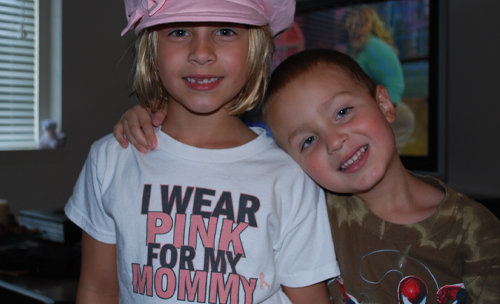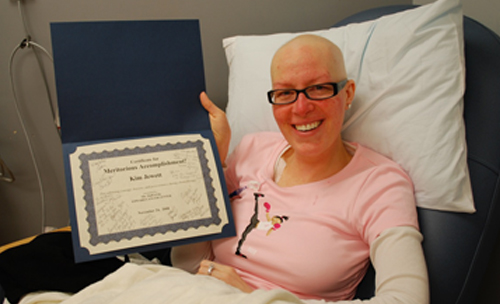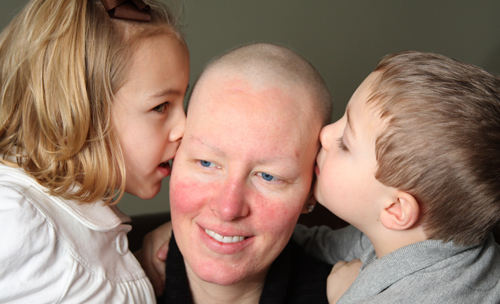By Patricia Fitzmorris Danflous
Your mom has brain cancer.
You are the primary care partner.
You are 31 and diagnosed with breast cancer.
Your children are six and four.
Four years later, your physician once again says “breast cancer.”
If adversity makes you stronger, Kimberly Irvine is Wonder Woman. While a first meeting projects her delicacy and beauty, it takes less than half a minute to discern her strength, determination, resilience and purpose. Irvine is a strong woman who built muscle by becoming a powerful advocate for herself. She continues to sculpt muscle by guiding others to do the same.
Twelve years after first learning the ache in her breast was something to worry about: she is Kalli and Tyler’s mother, cancer survivor, patient advocate, entrepreneur, consultant, motivational speaker, philanthropist, an Athleta ambassador and model, and a fiancée. The Chicago native, who once defined herself as a stay-at-home mom, recently added author to her life’s journey list. In “STRONG[ER+]” she details her cancer battle, the challenge of raising young children in between chemotherapy treatments, the emotional drain of divorce and the energy required to start a business. It’s a story of struggle and survival, but more than that, it is a lesson in hope and gratitude, a guide to finding purpose.
Irvine’s decision to direct proceeds of her book, which hit Amazon’s Best Seller New Release and Best Seller lists within weeks of publication, demonstrates her generosity and commitment to purpose. Funds raised from book sales are directed to the Conquer Cancer Foundation of the American Society of Clinical Oncology. “We should all be advocates for ourselves, for patients with cancer, and for the doctors working to care for us all,” said Irvine. She added that funds raised will also include the awarding of a grant to an early-career researcher with a focus on breast cancer.
“God has a purpose for me,” Irvine reflected with conviction. “I gave up a career to focus on my kids and knew that staying at home was what I wanted, but I also recognized that I had a purposeful passion to help others.”
“During the time I was a stay at home mom you watched Oprah Winfrey,” she said, laughingly referring to the celebrity’s focus on living a purposeful life as a spark to action. But it was her mother’s brain cancer diagnosis, treatment and survival that is her fuel for success. “To see how my mother fought the magnitude of her seizures was inspiration. My strength today comes from her.”
The advice to have faith in God, to hope thanks to new drugs and research, and to celebrate with a glass of champagne while living every day to the fullest was a good foundation for my emotional health.
Today, her purpose might be as simple as reminding a young woman to schedule a mammogram. If you sit next to Irvine on an airplane, for example, you are certain to hear a recommendation for early and frequent breast cancer screening. “I never sit in silence about it,” she said.
Breast cancer prevention and early detection are not usually top of mind for a 31-year-old – only about four percent of women under 40 will be diagnosed with the disease. “Other than migraines, I had been really healthy,” Irvine recalled.
When she began feeling that something was not right with her body, losing weight and noticing a slight achiness in her breast, she attributed the symptoms to the stress caring for her mom. It was her mother, however, who encouraged investigation. Heading to her ob/gyn, Irvine’s concerns were essentially brushed off – “you’re too young for breast cancer, don’t worry, it’s probably a fibroadenoma. Remember, you’re under a lot of stress,” she heard. Fortunately, the seeds of self-advocacy were taking root and Irvine stood her ground. She requested a mammogram even though her physician reluctantly signed the order. “When the radiologist told me that I did have a suspicious lump, I remember thinking, thank goodness I had challenged my doctor,” she stated.
“Can this really be happening?” she asked in shock and disbelief when the cancer diagnosis requiring surgery, chemotherapy and radiation was confirmed. It was not good news, but a blessing that she had insisted on pursuing a screening. “My first concerns were immediate and not unusual – fear of dying, hair loss, and worry about spending days with my face in the toilet bowl after chemotherapy.”
When the cancer returned four years later, her fear of dying increased along with concern for her children’s well-being. “The second -time around my kids were 10 and 8, a developmental age to understand more,” Irvine said. ”When your daughter asks if you are going to die, that hits hard.”

While living with the fear of dying became her new normal, her second battle also made her more cognizant of her emotional condition. “I remember asking my oncologist about handling the fear and uncertainty that comes with a cancer diagnosis,” she said. “The advice to have faith in God, to hope thanks to new drugs and research, and to celebrate with a glass of champagne while living every day to the fullest was a good foundation for my emotional health.”
“I am going to fight every day,” she recalled her renewed intellectual philosophy. “I would be fierce with more fight for my kids. My determination to survive grew as I leaned more and more into my faith and I sought mental health assistance.”

Talking to someone about the emotional and mental health aspects of cancer reinforced her resolve to be strong, to live in the present, to advocate for herself and to help others. “I want other moms to have hope, courage and strength. We have to become our own best advocates,” she emphasized. “Every day you have choice, from what you put in your mouth to what you put in your thoughts. We weren’t taught to be self-advocates, but we can evolve from adversity and not let it define us.”
Irvine’s strength and self-discovery opened the path for a highly successful business as a patient advocate consultant. Based in Chicago, KGI Health bridges the gap between pharmaceutical & biotech companies when they are bringing products to market by sharing the patient and care partner perspective. She’s a high-demand motivational speaker and has regularly testified before the U.S. Food and Drug Administration regarding drug approval.
“I am living my passion now and more grateful than I have ever been,” she explained.
The collateral damage of surviving cancer is present, nevertheless. “There is a fear every time I go in for routine follow up with my doctors,” she said. “But I stay in the present in traumatic situations, rely on my medical and business teams, think of my children, and take time to play with my puppies.”
Irvine is vividly aware of what an impact cancer has on a family. She is engaged to a man who lost his wife to cancer. His children lost their mother. “There is a reason I survived for my kids,” she reflected. “It’s something I don’t fully understand, but I continue to define my purpose and do the right thing.”

Kimberly’s Top Ten Tips
Be Your Own Advocate in a Healthcare crisis.
- Educate yourself. When you are armed with education, that knowledge is power.
- Identify the healthcare professionals that you want on your team, but remember that you are the CEO of the team.
- Identify your support community and the care partners within that community. You want people sitting alongside of you, giving you the support that you need and taking notes.
- Seek out second and potentially third opinions.
- Know your family history, your genetics. There has been tremendous advancement in the space of genetics over the last decade and how it plays a role in cancer and other chronic illness and rare disease.
- Choose self-care. What are other integrative approaches that you can take alongside the medication route – acupuncture, exercise, nutrition, the psychosocial component of care.
- Make a list of questions for your healthcare team.
- Have your care partner with you and someone in your network at all your medical appointments and treatments.
- Organize yourself with a planner for your medical records, bills, a calendar and a spot for questions. Make your planner a toolkit to help you and your care partner.
- Hold on to hope, to have the strength and the courage and the faith to know that you can get through your treatment journey.



